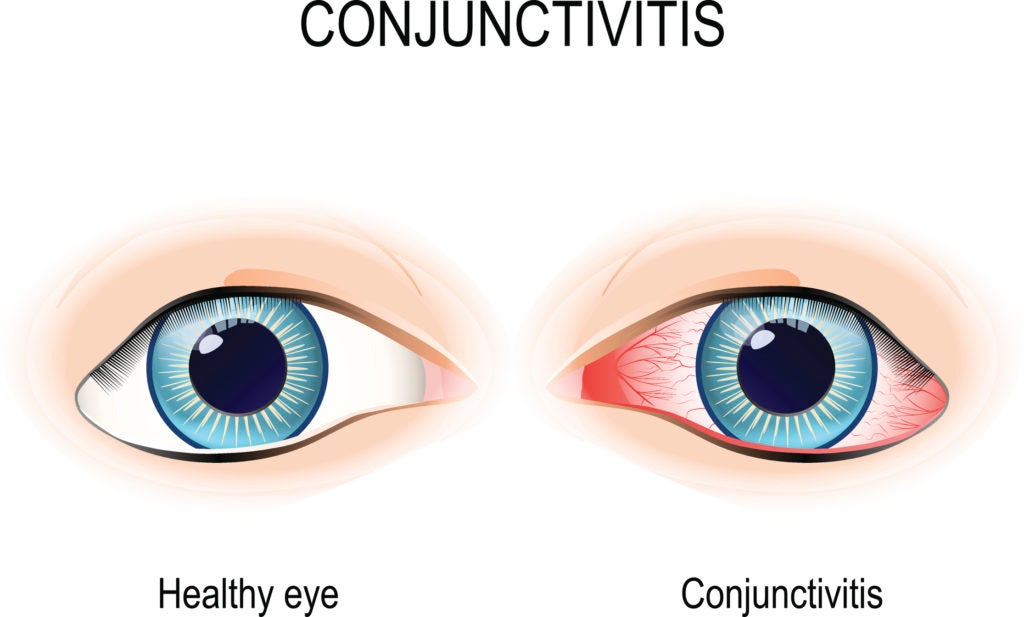Reducing your Risk of Pinkeye

Have you ever had conjunctivitis? If you have, you’ll probably never forget it. An inflammation of the conjunctiva, the transparent membrane lining your eyelid and covering the white part of your eyeball, conjunctivitis causes symptoms that can be extremely uncomfortable. But how much do you know about this condition?
- Conjunctivitis is typically caused by a bacterial or viral infection. It can also be caused by an allergic reaction, a chemical splash in the eye, or a foreign object in the eye. When a person has conjunctivitis, the blood vessels in the conjunctiva become inflamed, making the whites of the eyes to look pink or red.
- Symptoms of conjunctivitis are irritating, but not usually vision-threatening. Common symptoms include redness, itchiness, tearing, a gritty feeling, and discharge that can crust over at night and keep your eyes from opening in the morning. Sometimes, though, serious eye conditions can make your eyes red, cause eye pain, make you feel like something is stuck in your eye, and caused blurred vision and light sensitivity. If this happens, you should see a doctor as soon as possible.
- Conjunctivitis is as contagious as the common cold. Whether bacterial or viral, it’s spread by direct or indirect contact. That’s why you should never share anything that touches the eye or the surrounding area with another person. This includes eye cosmetics, personal eye care items, and contact lenses. If you wear contact lenses and have symptoms of conjunctivitis, stop wearing the lenses immediately and contact your doctor if the symptoms don’t improve within 12-24 hours.
- Your doctor can treat conjunctivitis, but the treatment depends on the type of infection. If it’s a virus, it will just have to run its course, but if it’s bacterial, you may be prescribed antibiotics, either in the form of eye drops, pills, or ointments. The course of antibiotics can run anywhere from 3 days to a week, and it’s important to keep taking the medication as directed by your doctor, even if the symptoms improve. For allergic conjunctivitis, antihistamines can improve your symptoms. Your doctor will probably want to schedule a follow-up visit to make sure the medicine is working.
- There are also steps you can take to prevent conjunctivitis. Good hygiene is the key to keeping your eyes healthy. Don’t touch your eyes, wash your hands often, use a clean towel and washcloth daily, and don’t share towels and washcloths. Change your pillowcases often, and if you’ve had conjunctivitis, throw away your eye cosmetics.
Whether you’re dealing with a condition like conjunctivitis or just need an ophthalmologist or optometrist in Derry, Londonderry or Windham, Spindel Eye Associates is here for you. Celebrating our thirtieth year of eye care, we proudly provide our patients with personalized eye care, using top of the line technology. For more information or to schedule an appointment call 603.421.6536 or contact us through our website.
RECENT POSTS
categories
- Uncategorized
- Eye Exams
- Lasik
- Spindel Eye Reviews
- Cataracts
- Dry Eyes
- Refractive Errors
- Infographic
- Glaucoma
- Macular Degeneration
- Ocular Diseases
- Pulsed Light Therapy
- IPL
- eye care
- eye health
- Eye irritation
- Eye Syndrome
- Eye Doctors
- Diabetes
- Contacts
- LASIK Surgery
- dry eye syndrome Manchester
- Glasses
- Vision Care
- LipiFlow
- Contact Lenses
- Astigmatism
- Crizal Prevencia
- Spindel Eye
- Children
- skin cancer
- Sunglasses
- Eye Disease
